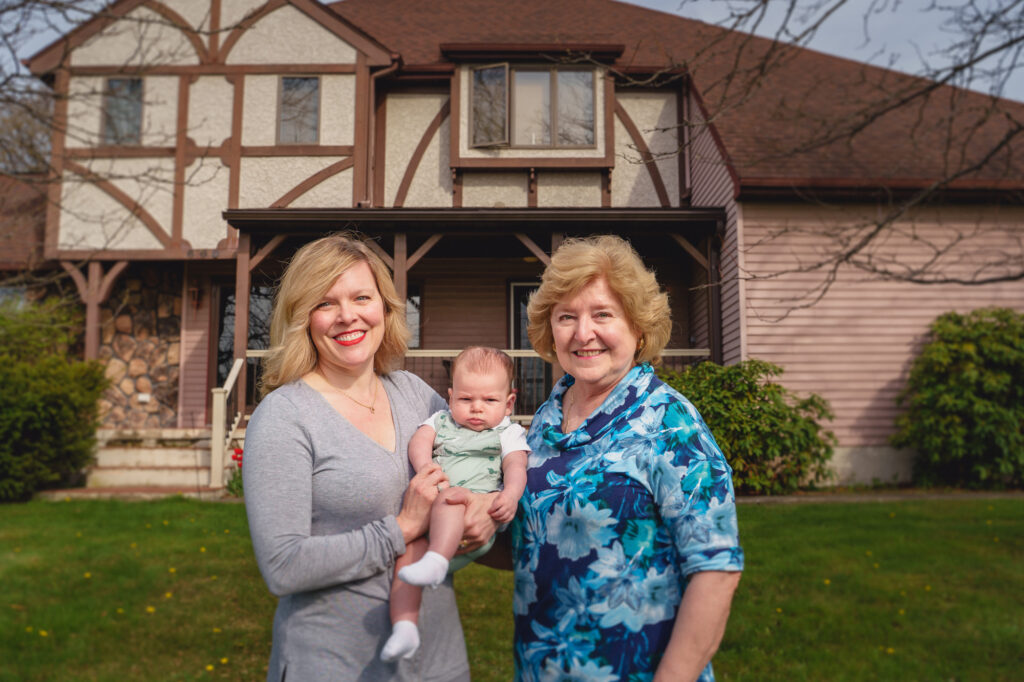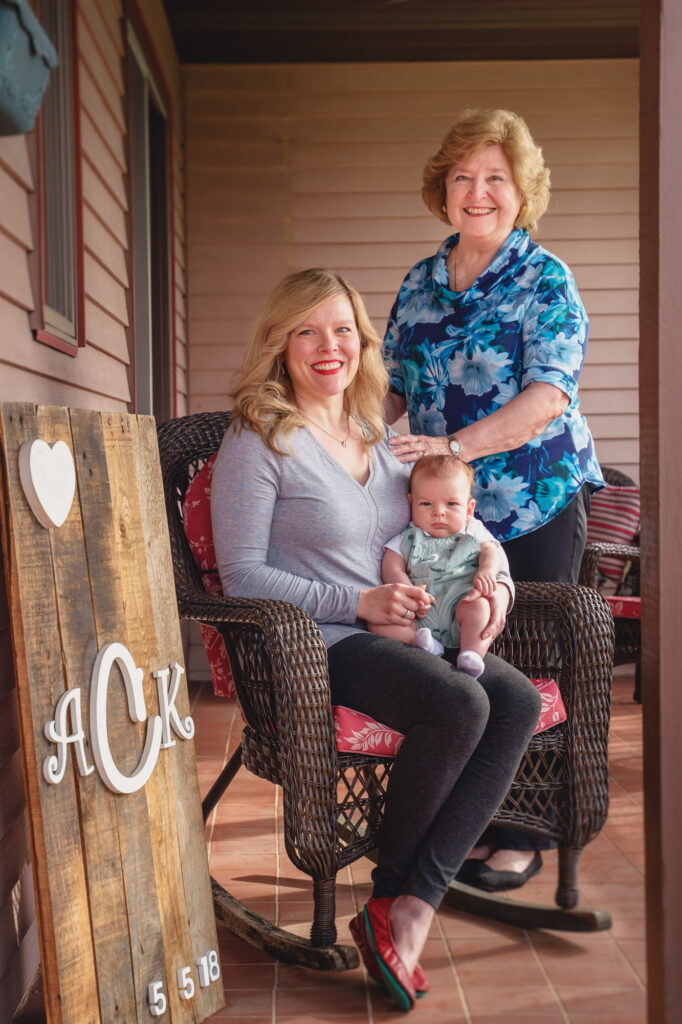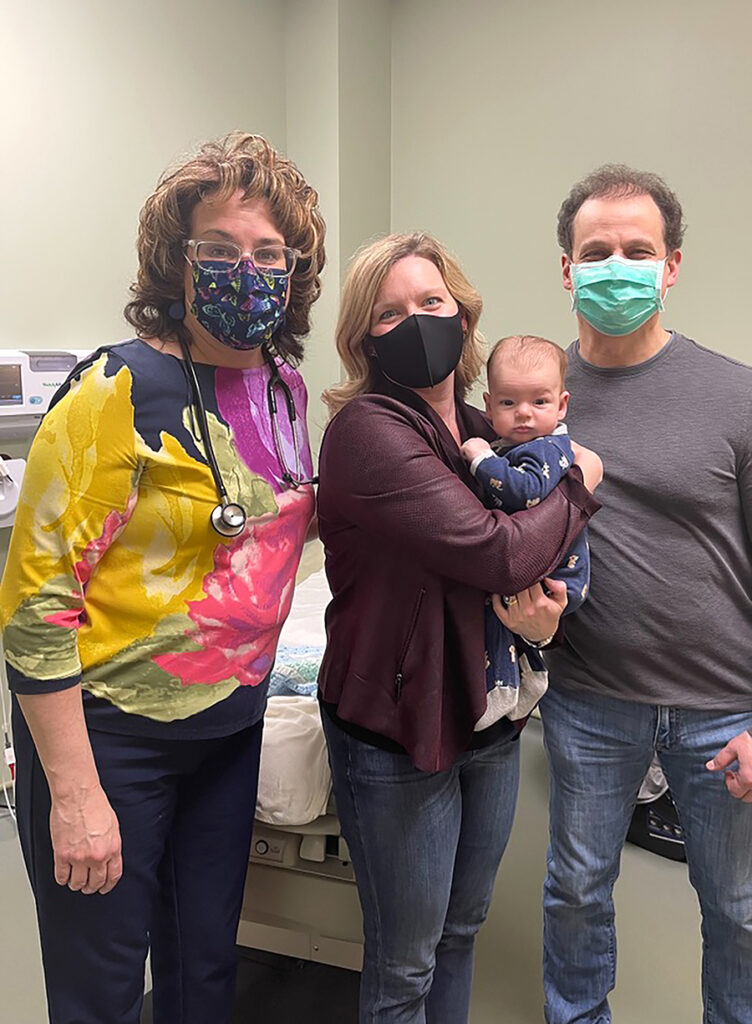News
Counting New Baby, Four Generations of Family Served by The Wright Center

Our ‘medical home’ connects patients, physicians in trusting bond
Upon giving birth to a healthy baby boy in January, Amy Cortazzo texted the joyous news about her first child to immediate family members and then to a person who, while not related, was key to Amy’s successful pregnancy.
The text recipient was Dr. Linda Thomas-Hemak, president and CEO of the Wright Center for Community Health.
Known as “Dr. Linda” to Amy and her family, Dr. Thomas-Hemak has long served as the family’s primary care physician and a trusted advisor when navigating new life stages and circumstances, such as caring for elderly parents, or in Amy’s recent case, attempting to conceive.
Baby Kristov, who entered the world at 3:38 a.m. on a Saturday, represents the fourth generation of the family to be cared for at The Wright Center, specifically as patients of Dr. Thomas-Hemak.
“Kristov is, literally, a living testament to her help,” says Amy. “Because we wouldn’t have had him, I don’t think, if it hadn’t been for her.”
Amy got married in 2018, while in her early 40s, and after more than a year of “struggling to get pregnant” she sought the assistance of area fertility specialists. None was exactly the right fit for her situation and needs, she says. In desperation, she called Dr. Thomas-Hemak.
“I said, ‘Look, I know you’re not an OB, but I just need some advice,” says Amy. “Not only did she do everything in her professional power to help us. But I feel as though there was almost a spiritual guidance too; she just really had a very calming way. Especially since at the time I was very emotional; I was really eager to have a child. She was so good at putting our minds at ease and helping us to think positively.”
Based on Dr. Thomas-Hemak’s research and referral, the couple connected with a New Jersey-based specialist who provided Amy with the answers, comfort and, ultimately, the solution that made her wish come true. Kristov, at 8 pounds, 5 ounces, was born at Moses Taylor Hospital in Scranton, arriving on the fifth anniversary of the date his mother and father had first met. Since then, Amy and her infant son have made multiple visits for routine pediatric checkups to The Wright Center’s Mid Valley Practice in Jermyn – a place the family knows well, and where the care team and support staff recognizes them.
“It really is a very familial kind of environment because of all the personal connections we’ve made, not just with our doctor but with her staff,” Amy says.
Those close relationships between patient and provider are essential to The Wright Center’s role in the community as a patient-centered medical home; the term “medical home” refers not so much to a specific place but rather a special way of delivering healthcare.
Under the medical home model of care, each patient is viewed as an important member of the healthcare team, and the individual’s unique needs, values, culture and preferences help to shape the treatment plan. The patient visits a single site for comprehensive care, which may include physical, behavioral health and dental care, plus other services, such as prevention/wellness education. The patient gets to know the doctor, and vice versa. This trusting relationship can give a patient the confidence to talk openly about health concerns and personal issues, resulting, in many cases, in earlier treatment of potentially serious conditions and in better health outcomes.


For Amy, a Dickson City resident and school teacher, The Wright Center essentially goes a step above “patient-centered.” It’s essentially family tree-centered. Kristov and Amy routinely get their care at The Wright Center. Amy’s mother, Joanie Rummerfield goes there, too. And so did Joanie’s parents, who are now deceased.
In fact, Joanie credits the care given to her parents under Dr. Thomas-Hemak’s compassionate oversight for increasing their longevity. “I know she gave them more years,” says Joanie, a former nurse. “They were 91 and 92 when they passed.”
Both Amy and Joanie are appreciative that The Wright Center’s clinics, beyond offering high-quality primary care, also serve as training sites for physicians enrolled in The Wright Center for Graduate Medical Education’s residency and fellowship programs. “In a teaching environment like that, you always get the best, most thorough care,” says Joanie. “The doctors are on their toes because they’re teaching. And you get more eyes and ears on you as a patient than you would typically get.”
Amy and her mother began scheduling their doctor appointments with Dr. Thomas-Hemak soon after she first began practicing in Northeast Pennsylvania, recruited to return to her home community by the late Dr. Tucker Clauss. The family’s relationship with her, however, extends back to her pre-medical school days, when she worked in an area restaurant that the family frequented for Sunday breakfasts.
In the years since, they have turned to their primary care physician to handle mundane matters – including employment-related physical exams, well visits and minor scrapes and sicknesses – as well as life’s most significant ones, such as dying with dignity.
“Dr. Linda came to see my grandparents, making house calls during their later years,” Amy says. “That’s just the type of person she is. And that’s the type of person we knew her to be all those years ago when we first met her at the restaurant. It kind of culminated in this wonderful relationship that we have with her now.”
Amy’s doctor, who is now in many respects a family friend, has been with them as they mourned at memorial services. She has alleviated their discomforts. She has answered their questions. She’s counseled them on bringing new life into the world and celebrated a birth. Along the way, she has left a gentle, healing imprint on four generations.
“And Dr. Linda is young enough,” Joanie says, while laughing, “to tackle a fifth generation.”








